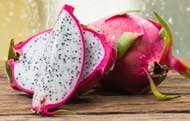
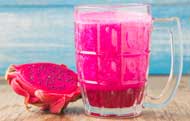
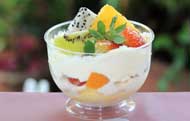

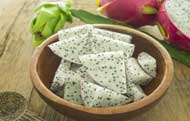

1. Dragon Fruit Facts
2. Types of Dragon Fruit
3. Nutritional Value of Dragon Fruit
4. Health Benefits of Dragon Fruit
Selenicereus undatus, the white-fleshed Dragon Fruit (pitahaya), is a species of the genus Selenicereus (formerly Hylocereus) in the family Cactaceae and is the most cultivated species in the genus. It is used both as an ornamental vine and as a fruit crop, the pitahaya or dragon fruit.
History and Origin
America, where it has been documented since the 16th century. French missionaries introduced it to Indochina around the 1860s, and from there, cultivation spread throughout Asia and other tropical and subtropical regions globally. Today, Vietnam is the first country to begin large-scale international export of dragon fruit, and it is now grown in more than 30 countries worldwide.
- • White-fleshed
- • Red-fleshed
- • Yellow-skinned
- • Aussie Gold
- • Pink Diamond
- • Columbian Red (Supreme)
- • Condor
- • Asunta
- • Zamorano
- • Aztec Gem
- • Trisha
- • Giant Orange
- • Malaysian Purple
- • Physical Graffiti
Dragon fruit varieties sold in Australia include the common white-fleshed (Hylocereus undatus), red-fleshed (Hylocereus costaricenis), and yellow-skinned (Hylocereus megalanthus) types, alongside many named Australian and international varieties like Aussie Gold, Pink Diamond, Condor, Asunta, Zamorano, Columbian Red, and Aztec Gem.
Common types
White-fleshed: Pink skin with white flesh, considered the most common type, and has a mild, sweet flavour.
Red-fleshed: Pink/red skin with red flesh, known for a richer, slightly earthier flavour.
Yellow-skinned: Yellow skin and white flesh, it is generally the sweetest type available.
Named varieties
Aussie Gold: A golden-yellow skinned variety with white or pink flesh and a sweet taste.
Pink Diamond: A variety with deep, pink-fleshed fruit that has a good flavour profile.
Columbian Red (Supreme): A medium to large fruit with an earthy flavour and reasonable sweetness. It is a commonly grown variety in Australia.
Condor: A popular and widely sold variety.
Asunta: A hybrid variety that is sometimes sold commercially.
Zamorano: A popular variety known for its spectacular flowers and fruit.
Aztec Gem: A popular variety with spectacular flowers.
Trisha: A variety with potential to ripen depending on the season's warmth.
Giant Orange: A variety with a larger-than-average fruit size.
Malaysian Purple: A variety with purple flesh.
Physical Graffiti: A variety with pink skin and red flesh.
Fruit ” Dragon ” ( Nutritional value )
Nutritional value per 100 g - Just over 1/2 Cup
Dragon, fruit, raw
|
Nutrient ( Proximate’s )
|
Unit
|
Value
|
Daily Value %
|
|
Energy
|
kcal
|
||
|
Protein
|
g
|
||
|
Total lipid (fat)
|
g
|
||
|
Carbohydrate, by difference
|
g
|
||
|
Fiber, total dietary
|
g
|
||
|
Sugars, total
|
g
|
||
|
Minerals
|
|||
|
Calcium, Ca
|
mg
|
||
|
Iron, Fe
|
mg
|
||
|
Magnesium, Mg
|
mg
|
||
|
Phosphorus, P
|
mg
|
||
|
Potassium, K
|
mg
|
||
|
Sodium, Na
|
mg
|
||
|
Zinc, Zn
|
mg
|
||
|
Copper, Cu
|
mg
|
||
|
Manganese, Mn
|
mg
|
||
|
Selenium, Se
|
mcg
|
||
|
Vitamins
|
|||
|
Vitamin C, total ascorbic acid
|
mg
|
||
|
Thiamin (B-1)
|
mg
|
||
|
Riboflavin (B-2)
|
mg
|
||
|
Niacin (B-3)
|
mg
|
||
|
Pantothenic acid (B-5)
|
mg
|
||
|
Vitamin B-6
|
mg
|
||
|
Vitamin B-12
|
mg
|
||
|
Folate (B-9)
|
mcg
|
||
|
Vitamin A, RAE (retinol)
|
mcg
|
||
|
Vitamin E (alpha-tocopherol)
|
mg
|
||
|
Vitamin D (D2 + D3)
|
mcg
|
||
|
Vitamin K (phylloquinone)
|
mcg
|
||
|
Lipids
|
|||
|
Saturated Fatty Acids
|
g
|
||
|
Monounsaturated Fatty Acids
|
g
|
||
|
Polyunsaturated Fatty Acids
|
g
|
||
|
Trans Fatty Acids
|
g
|
||
|
Carotenoids
|
|||
|
Beta-Carotene
|
mcg
|
||
|
Lutein + zeaxanthin
|
mcg
|
||

|
Reference Values are based on a 2,000 Calorie Intake, for Adults and Children 4 or More Years of Age. Your daily values may be higher or lower depending on your calorie needs.
|
|
Percentages are roughly approximated using (RDA) Recommended Dietary Allowances for adults. Source: USDA United States Department of Agriculture
|
|
Reference Values for Nutrition – FDA U.S. Food and Drug Administration
|
Dragon Fruit Nutritional Value
Dragon fruit provides numerous health benefits, including boosting the immune system with vitamin C and other antioxidants, improving digestive health through its fiber and prebiotic content, and protecting against chronic diseases like cancer and heart disease. It also contains nutrients that support bone density, skin health, and blood sugar regulation.
- HELPS REGULATE BLOOD SUGAR
Dragon fruit can help regulate blood sugar due to its high fiber content, low glycaemic index, and presence of antioxidants, which can lead to more stable blood sugar levels. The soluble fiber in the fruit slows sugar absorption, while antioxidants and other bioactive compounds may improve insulin resistance and lower fasting blood glucose. Clinical trials have shown reduced blood sugar and triglyceride levels with dragon fruit consumption. - AIDS DIGESTION
Yes, dragon fruit aids digestion because its high fiber content promotes regularity, and it contains prebiotics that support a healthy gut microbiome. The fiber softens stool and adds bulk, while prebiotics feed beneficial gut bacteria. - FIGHTS CELL DAMAGE
Dragon fruit helps fight cell damage due to its high antioxidant content, which neutralizes free radicals that can lead to inflammation and chronic diseases. The fruit contains several types of antioxidants, including vitamin C, carotenoids, betalains, and flavonoids, which protect cells and support overall health. - HYDRATES THE BODY
Dragon fruit hydrates the body due to its high-water content, which is over 90% water, making it an excellent source of fluids that help maintain bodily hydration and support metabolic functions. This high moisture content also aids in digestion by softening stool, promoting bowel movements, and preventing constipation. - CONTRIBUTES TO CANCER PREVENTION
Antioxidant-rich foods like dragon fruit work by neutralizing free radicals, thus preventing cell damage and inflammation. Studies suggest that diets high in antioxidants may help prevent chronic diseases such as heart disease, cancer, diabetes, and arthritis. - PROMOTES SKIN HEALTH
Dragon fruit promotes skin health through its high content of antioxidants like vitamin C and E, which protect the skin from damage, support collagen production, and reduce signs of aging. Its hydrating properties, B vitamins, and anti-inflammatory compounds further contribute to skin health by keeping it moisturized, improving texture, and helping to soothe issues like acne.
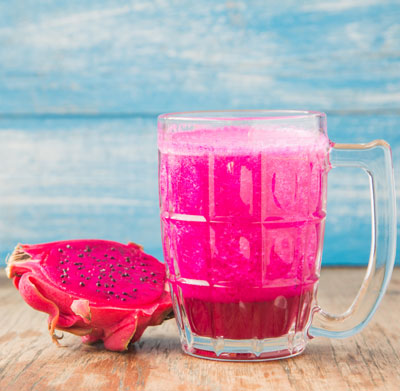
- PROMOTES GUT HEALTH
Dragon fruit promotes gut health due to its high fiber content and prebiotic oligosaccharides, which nourish beneficial gut bacteria and help prevent constipation. These prebiotics, such as Dragon Fruit Oligosaccharides (DFO), stimulate the growth of good bacteria like Lactobacillus and Bifidobacterium while helping to decrease harmful ones. - BOOSTS BONE DENSITY
Dragon fruit boosts bone density due to its content of calcium and magnesium, both of which are essential minerals for building and maintaining strong bones. Calcium directly contributes to bone strength and mineral density, while magnesium aids in the absorption of calcium and helps prevent bone-related issues like osteoporosis. - SUPPORTS EYE HEALTH
Dragon fruit supports eye health because it is rich in beta-carotene, which the body converts to vitamin A, a nutrient vital for vision. Additionally, dragon fruit contains other carotenoids and antioxidants that help protect the retinas and may guard against age-related macular degeneration and other eye conditions. - SUPPORTS HEART HEALTH
Dragon fruit supports heart health by improving cholesterol levels, reducing inflammation, and providing essential nutrients like fiber, antioxidants, and healthy fats. It can help lower "bad" LDL cholesterol and triglycerides while increasing "good" HDL cholesterol. Its high fiber content also supports digestive health, which is linked to reduced cardiovascular risk. - REDUCES INFLAMMATION
Yes, dragon fruit can help reduce inflammation due to its high antioxidant content, including compounds like vitamin C, flavonoids, and betalains. These antioxidants neutralize free radicals, which helps prevent cell damage and combat oxidative stress and chronic inflammation, potentially easing symptoms of inflammatory conditions. - SUPPORTS IMMUNE FUNCTION
Dragon fruit supports immune function through its rich content of Vitamin C, which stimulates immune cells, and its antioxidants like polyphenols, which protect against cell damage and inflammation. Additionally, its prebiotic fiber nourishes beneficial gut bacteria, which plays a crucial role in a healthy immune response.
References
Nutrient Database – USDA (United States Department of Agriculture)
Reference Values for Nutrition – FDA U.S. Food and Drug Administration
Fights cell damage - Dragon fruit helps fight cell damage due to its high antioxidant content, which neutralizes free radicals that can lead to inflammation and chronic diseases. The fruit contains several types of antioxidants, including vitamin C, carotenoids, betalains, and flavonoids, which protect cells and support overall health.
Reduces inflammation - Yes, dragon fruit can help reduce inflammation due to its high antioxidant content, including compounds like vitamin C, flavonoids, and betalains. These antioxidants neutralize free radicals, which helps prevent cell damage and combat oxidative stress and chronic inflammation, potentially easing symptoms of inflammatory conditions.
Promotes skin health - Dragon fruit promotes skin health through its high content of antioxidants like vitamin C and E, which protect the skin from damage, support collagen production, and reduce signs of aging. Its hydrating properties, B vitamins, and anti-inflammatory compounds further contribute to skin health by keeping it moisturized, improving texture, and helping to soothe issues like acne.
Promotes gut health - Yes, dragon fruit promotes gut health due to its high fiber content and prebiotic oligosaccharides, which nourish beneficial gut bacteria and help prevent constipation. These prebiotics, such as Dragon Fruit Oligosaccharides (DFO), stimulate the growth of good bacteria like Lactobacillus and Bifidobacterium while helping to decrease harmful ones.
Aids digestion - Yes, dragon fruit aids digestion because its high fiber content promotes regularity, and it contains prebiotics that support a healthy gut microbiome. The fiber softens stool and adds bulk, while prebiotics feed beneficial gut bacteria, which can improve the overall digestive process.
Supports heart health - Dragon fruit supports heart health by improving cholesterol levels, reducing inflammation, and providing essential nutrients like fiber, antioxidants, and healthy fats. It can help lower "bad" LDL cholesterol and triglycerides while increasing "good" HDL cholesterol. Its high fiber content also supports digestive health, which is linked to reduced cardiovascular risk.
Helps regulate blood sugar - Yes, dragon fruit can help regulate blood sugar due to its high fiber content, low glycaemic index, and presence of antioxidants, which can lead to more stable blood sugar levels. The soluble fiber in the fruit slows sugar absorption, while antioxidants and other bioactive compounds may improve insulin resistance and lower fasting blood glucose. Clinical trials have shown reduced blood sugar and triglyceride levels with dragon fruit consumption.
Contributes to cancer prevention - Antioxidant-rich foods like dragon fruit. Antioxidants work by neutralizing free radicals, thus preventing cell damage and inflammation. Studies suggest that diets high in antioxidants may help prevent chronic diseases such as heart disease, cancer, diabetes, and arthritis.
Supports immune function - Dragon fruit supports immune function through its rich content of Vitamin C, which stimulates immune cells, and its antioxidants like polyphenols, which protect against cell damage and inflammation. Additionally, its prebiotic fiber nourishes beneficial gut bacteria, which plays a crucial role in a healthy immune response.
Boosts bone density - Dragon fruit boosts bone density due to its content of calcium and magnesium, both of which are essential minerals for building and maintaining strong bones. Calcium directly contributes to bone strength and mineral density, while magnesium aids in the absorption of calcium and helps prevent bone-related issues like osteoporosis.
Hydrates the body - Dragon fruit hydrates the body due to its high-water content, which is over 90% water, making it an excellent source of fluids that help maintain bodily hydration and support metabolic functions. This high moisture content also aids in digestion by softening stool, promoting bowel movements, and preventing constipation.
Supports eye health - Dragon fruit supports eye health because it is rich in beta-carotene, which the body converts to vitamin A, a nutrient vital for vision. Additionally, dragon fruit contains other carotenoids and antioxidants that help protect the retinas and may guard against age-related macular degeneration and other eye conditions.
Potential anti-cancer effects - Dragon fruit (red pitaya) contains antioxidants and bioactive compounds that, in laboratory and animal studies, have shown potential anti-cancer effects against certain cancers, particularly breast and prostate cancer. However, it is important to note that no single food can prevent or cure cancer, and research in humans is still in its early stages.
